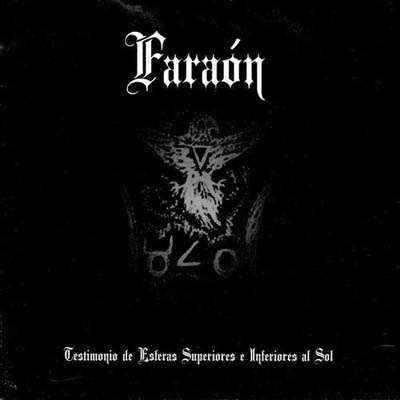
article written by Belisario
This album is the debut opus and the only recording done by Argentinian project Faraón (Spanish for “pharaoh”), a short-lived one-man band set in motion by the individual known as Temptor Princnegsur, possibly just before putting it on hold to focus on his main act, Gevurahel. One of the most fascinating things about this record is that it has seen almost no circulation since it appeared in self-released format, shortly after the turn of the millennium, failing to gather the slightest bit of attention until the year 2017, when a fellow Argentinian small-sized label called Sons of Hell Prod. decided to release a reissue.
Its full title reads Testimonios de Esferas Superiores e Inferiores al Sol… (Spanish for “Testimonies of Spheres Above and Below the Sun…”), often shortened to “T.E.S.I.S.”, an acronym that could hardly be ascribed to a mere coincidence. Although Metal Archives lists this as a demo, its remarkable length and the mature and serious nature of the compositions imply that this is a proper full-length, with obvious limitations regarding production and distribution (the latter undoubtedly deliberate, the former probably as well) yet developed enough as to be considered a full and complete opus.
In contrast to what would later be cultivated with Gevurahel, whose style is characterized by raw and basic instrumentation, Faraón’s music is epic and slowly delivered black metal with an extensive use of keyboards. In spite of the conservative and aggressive approach, one of the key elements here is a certain tendency towards the symphonic style, something rather surprising for such a homemade production. Nevertheless, the keyboards melt rather well with the rest of the instruments and do not sound soppy as is often the case with this instrument.
The melodic weigh is shared on equal terms between the guitars and the keyboards, which keeps a balance and avoids losing the overall direction. Far from the format almost bordering on eurodance developed, among others, by the infamous Dimmu Borgir, the nearest comparison could be drawn with Gontyna Kry’s Krew naszych ojców in its method of maximizing the epic feel without falling into ridiculous excessiveness.
The albums tops off slightly beyond the 60-minute mark and comprises eight tracks, four of which are rather long (one of them stretching out to 17 minutes) and the rest arranged as a sort of interludes that help to expand the sound palette. The main songs are lengthy but quite varied, thanks to a composition method that is basic yet effective and consists in setting up individual blocks that come one after the other, mechanically but also nimbly, without any sequence being stretched out beyond what is necessary. There are frequent stops which work very well to set the pace, and there’s even room for some simple solos that fit in perfectly and provide a dynamic counterpoint to the gradual advance of each section.
The different passages become enveloping without falling into monotony as they unhurriedly cumulate dark and bombastic melodies which result in an aural magnificence, in complete accordance with the message that is meant to be expressed. With more passion than means, Faraón manages to turn its sincere and patent inspiration into firm and convincing sound that lights up the spirit and nourishes the soul.
What is clearly and effectively expressed by the music gets finally crystallized when one takes a look at the lyrics, which are more recited prose than actual verses subject to any kind of meter. We find in them esoteric tales, verging on the mystic, that seem to suggest a take on Satanism that is as interesting as it is unusual: God and its servants as a symbol of oppression and Satan as a synonym of freedom, a violent and chaotic liberation indeed, yet so powerful that its attraction is irresistible.
It is not evil for the sake of evil, as insinuated by so many metal bands with little interest in developing their thematic content beyond stirring some clichés, being instead a philosophical quest for freedom which involves tearing down and breaking all that is perceived as barriers, walls and shackles imposed by the domination over consciences. The Evil One here portrayed is rather the rebel angel from Gustave Doré than the Prince of the Underworld as depicted in medieval imagery. Although both figures belong to metal’s weltanschauung, the former undoubtedly presents far more interest and depth than the latter.
Along with more accessible biblical references, there are many hermetic allusions to demonic entities with which the author seems to be familiar. These appear somewhat confusing at first, but they are never extravagant nor insincere. It is not the reviewer’s duty neither in the reader’s interest to judge the veracity of any contact with the afterlife, however when said inspiration becomes a message and sound of such power and exaltation, the result well deserves the attention of both.
The most laudable feature in Faraón’s music, beyond the competent craft and stylistic soundness, is the gravity and authenticity it emanates, despite its disparate and heterogeneous elements. Honesty and dedication are manifest, and this does not derive from any particular proclaims by the band nor any cult status due to its underground nature, it is instead expressed by the music itself, the sole channel through which purely artistic communication occurs. This is the main secret behind the greatness of an underground pearl that fuses old-school feel and symphonic stylings as a vessel for its very own truth.
Original review in Spanish: http://www.elnegrometal.es/disco_del_mes_2017_09_septiembre_faraon_tesis.html
Tags: Black Metal, Faraon, T.E.S.I.S


Great review!
Thank you for this gem! \m/ Nice website too!